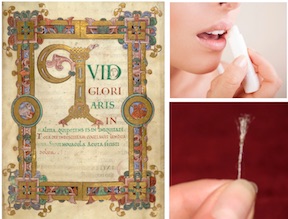SAN ANTONIO–The youngest founder of the American Academy of Audiology (AAA), the director of one of the world’s leading acoustical research laboratories, and a researcher whose publications have been cited in the scientific literature more than 1800 times were among those recognized at the Honors and Awards Banquet held March 26 during AudiologyNOW! 2015, the academy’s annual convention.
One of two Distinguished Achievement Award recipients this year was Brad Stach, PhD, who, as a 31-year-old doctoral student, was one of the 32 audiologists who gathered in Houston in January 1988 to create the American Academy of Audiology. In the academy’s early years Stach served as its secretary-treasurer and managed its business operations. Looking back, James Jerger, PhD, the academy’s founding president, said of his former doctoral student at Baylor College of Medicine, “It is very likely that we would not have an academy today without Brad’s contributions to its gestation and delivery.” Stach, a former AAA president, is director of audiology at Henry Ford Hospital and an adjunct professor at Wayne State University in Detroit. Previously, he held positions at the University of Texas, Baylor Medical Center, Georgetown University Medical Center, Stanford Medical Center, Dalhousie University in Nova Scotia, and Washington University in St. Louis.
Also presented with the Distinguished Achievement Award was Gary P. Jacobson, PhD, who is currently a professor and division director of audiology at Vanderbilt University. Jacobson succeeded Jerger as editor of the Journal of the American Academy of Audiology and preceded Stach at Henry Ford Hospital, where he was division head of audiology and founded its tinnitus clinic. He has also served as chief of audiology at the Cincinnati VA Medical Center. Jacobson has done groundbreaking research in the areas of electrophysiology, vestibular/balance (dys)function, and tinnitus, and developed a number of clinical tools, including the much-used Tinnitus Handicap Inventory.
The Samuel F. Lybarger Award for Achievements in Industry went to James M. Kates, an MIT-trained electrical engineer, who became an authority on hearing aid sound quality. Working at Siemens Hearing Instruments, AudioLogic, Cirrus Logic, and GN ReSound, he made groundbreaking advances in digital hearing aids and signal processing. His research into multiband compression and feedback-cancellation algorithms has influenced almost all of today’s hearing aids. Kates is now a scholar-in-residence at the University of Colorado at Boulder, where he is working on measures to predict hearing aid sound quality and speech intelligibility.
Four years after receiving a PhD in experimental psychology at the University of North Carolina, Joseph W. Hall III, strengthened his background in hearing research by completing a master’s in audiology from UNC in 1980. Since then, Hall’s research, writing, and teaching have profoundly influenced other investigators, students, and practicing audiologists. They also earned the Distinguished Professor and Chief of Audiology Research at the UNC Medical School this year’s Jerger Career Award for Research in Audiology. In his work, the author of more than 100 scientific publications has applied basic science techniques to populations that are not often studied, including normal children, children with conditions such as otitis media or attention deficit/hyperactivity disorders, and elderly subjects.
The academy’s 2015 International Award in Hearing was bestowed on Harvey Dillon, PhD, the long-time director of the Australian National Acoustic Laboratories (NAL), which helps shape how audiology is practiced worldwide. Dillon and his NAL team’s wide range of contributions to clinical practice include development of the Client Oriented Scale of Improvement (COSI) used to evaluate hearing aids, rehabilitation strategies, and other methods for improving hearing health. A leading lecturer and writer in audiology, Dillon’s textbook, Hearing Aids, has become the standard reference internationally for students, educators, clinicians, and researchers. The author of more than 200 scientific articles, Dillon received AAA’s Research Achievement Award in 2003.
AAA presented its newest honor, the Career Award in Hearing or Balance, to David Moore, PhD, an internationally renowned auditory behavioral neuroscientist. Moore, who is director of the Communication Sciences Research Center at Cincinnati Children’s Hospital Medical Center, has done pioneering work in auditory development and transformed our understanding of auditory processing disorders in children. Born in Australia, the honoree was on the faculty at Oxford University for 22 years, where he did research in auditory spatial hearing, biology of deafness, and the consequences of otitis media. He then directed the Institute of Hearing Research (IHR) in Nottingham from 2002 to 2012. There, he co-founded the Nottingham Hearing Biomedical Research Unit, which took basic research findings from IHR and conducted translational research on them in order to provide patient benefit. Moore was awarded the 2010 George Davey Howells Prize of the Royal Society of Medicine for editing the Oxford Handbook of Auditory Science.












